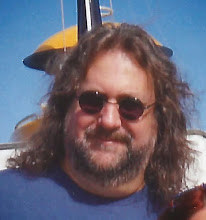Dragnet had its origins in Jack Webb's small role as a police forensic scientist in the 1948 film, He Walked by Night, inspired by the actual murder of a police officer in Los Angeles. The film was depicted in semidocumentary style, and Marty Wynn (an actual LAPD sergeant from the robbery division) was a technical advisor on the film. Webb and Wynn became friends, and both thought that the day-to-day activities of police officers could be realistically depicted, and could make for compelling drama without the forced sense of melodrama then so common in radio programming.All of this brings me to the clip below. As most know, Dragnet became a popular NBC TV series and Jack Webb became a real live TV star. But though most thought him too stodgy and uptight, he proved on one episode of the Tonight Show with Johnny Carson, that sometimes, if only for a few minutes, Jack Webb could let his hair down and not take his show, or his persona on the show, too seriously. Enjoy!
With writer James E. Moser, Webb prepared an audition recording, then sought the LAPD's endorsement; he wanted to use cases from official files in order to demonstrate the steps taken by police officers during investigations. The official response was initially lukewarm, but in 1950 LAPD Chief William H. Parker offered Webb the endorsement he sought. Police wanted control over the program's sponsor, and insisted that police not be depicted unflatteringly. This would lead to some criticism, as LAPD racial segregation policies were never addressed, nor was there a suggestion of police corruption.
The first several months of Dragnet were bumpy, as Webb and company worked out the program's format and eventually became comfortable with their characters. Gradually, Friday's deadpan, fast-talking persona emerged. Friday's first partner was Sgt. Ben Romero, portrayed by Barton Yarborough, a longtime radio actor. When Dragnet hit its stride, it became one of radio's top-rated shows.
Webb insisted on realism in every aspect of the show. The dialogue was clipped, understated and sparse, influenced by the hard-boiled school of crime fiction. Scripts were fast moving but didn’t seem rushed. Every aspect of police work was chronicled, step by step: From patrols and paperwork, to crime scene investigation, lab work and questioning witnesses or suspects. The detectives’ personal lives were mentioned, but rarely took center stage. (Friday was a bachelor who lived with his mother; Romero was an ever-fretful husband and father.) "Underplaying is still acting", Webb told Time. "We try to make it as real as a guy pouring a cup of coffee.” Los Angeles police chiefs C.B. Horrall and (later) William H. Parker were credited as consultants, and many police officers were fans.
Two announcers were used. Episodes began with announcer George Fenneman intoning the series opening ("The story you are about to hear is true; only the names have been changed to protect the innocent.") and Hal Gibney describing the basic premise of the episode. "Big Saint" (April 26, 1951) for example, begins with, "You're a Detective Sergeant, you're assigned to auto theft detail. A well organized ring of car thieves begins operations in your city. It's one of the most puzzling cases you've ever encountered. Your job: break it."
The story then usually began with footsteps and a door closing, followed by Joe Friday intoning something like: "Tuesday, February 12. It was cold in Los Angeles. We were working the day watch out of robbery division. My partner's Ben Romero. The boss is Ed Backstram, chief of detectives. My name's Friday."
Friday offered voice-over narration throughout the episodes, noting the time, date and place of every scene as he and his partners went through their day investigating the crime. At the end of an episode, announcer Hal Gibney would relate the fate of the suspect. They were usually convicted of a crime and sent to "the State Penitentiary" or a state mental hospital. Murderers were often "executed in the manner prescribed by law." Occasionally, police pursued the wrong suspect, and criminals sometimes avoided justice or escaped, at least on the radio version of Dragnet.
Johnny Carson - Copper Clappers - The most popular videos are a click away



1 comment:
Thanks for posting that, Barry! That's one of my all-time favorite sketches. I first saw it about 20 or 25 years ago on a Carson anniversary special.
Post a Comment